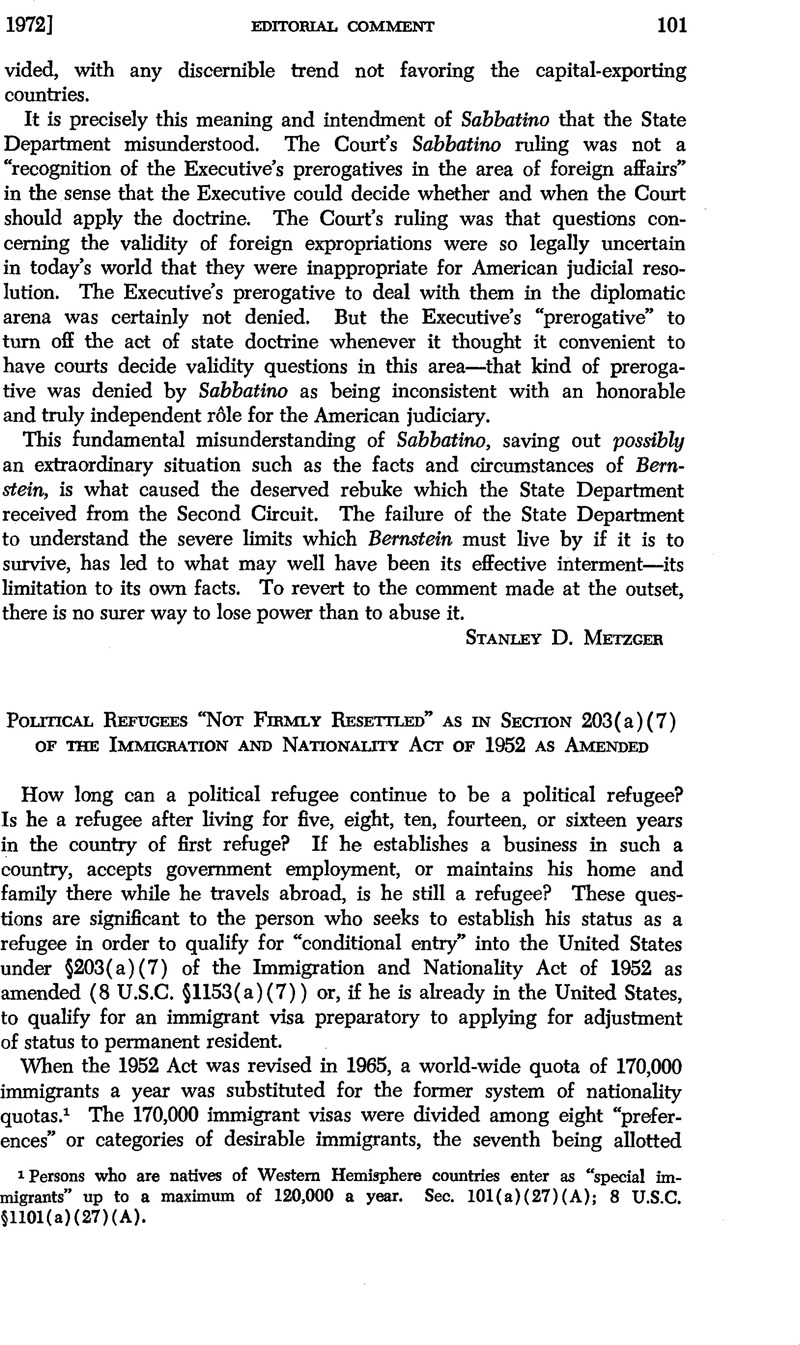Published online by Cambridge University Press: 28 March 2017

1 Persons who are natives of Western Hemisphere countries enter as “special immigrants” up to a maximum of 120,000 a year. Sec. 101(a)(27)(A); 8 U.S.C. §1101(a)(27)(A).
2 Sec. 203(a)(7)(B) provides that the President must define such “calamity.” A person who was displaced from his home in Skopje, Yugoslavia, as a result of the 1963 earthquake, which leveled the city, was denied an immigrant visa because the President had not taken cognizance of the disaster in terms of this section. Matter of Pasarikovski, 12 I & N Dec. 526 (1967).
3 The refugee does not have to prove that he would, in fact, be persecuted if he returned. Matter of Moy, 12 I & N Dec. 121 (1967).
4 Cf. Tai Mui v. Esperdy, 371 F.2d 772 (2d Cir., 1966), cert, denied, 386 U.S. 1017 (1967).
5 Displaced Persons Act, 1948, 62 Stat. 1009; Refugee Relief Act, 1953, 67 Stat. 400.
6 Yee Chien Woo v. Rosenberg, 419 F.2d 252 (9th Cir., 1969); Shen v. Esperdy, 428 F.2d 293 (2d Cir., 1970). For an analysis of the Ninth Circuit’s decision, see Mautino, “Aliens—Refugees—Resettlement in Third Country not Relevant to Determination of Eligibility for Refugee Status. Chien Woo v. Rosenberg (9th Cir., 1969),” 8 San Diego Law Review 138 (1971).
7 It may be noted that an applicant for a visitor’s visa must show that he has “a residence in a foreign country which he has no intention of abandoning. . . .” Sec 101(a)(15)(B); 8 U.S.C. §1101(a)(15)(B).
8 Woo had a Hong Kong Certificate of Identity; however, this is not conclusive evidence of resettlement. Matter of Ng, 12 I & N Dec. 411, 412 (1967).
9 Its statutory background gave the “not firmly resettled” requirement its weight. Cf. Matter of Rodriguez, in which a former Spanish national, who had acquired permanent residence in Cuba and five years later had fled to the United States, was denied an immigrant visa by the District Director on the grounds that as a single woman whose parents continued to live in Spain, she could return to Spain. The Regional Commissioner, reversing this finding, said: “In the matter at hand, we find that the District Director has imposed a condition precedent to the grant of refugee classification which is neither provided for nor contemplated by the statute. The ability of the applicant to return to the country of her birth and/or nationality, or to some other foreign country, is of no consequence provided, of course, the alien fits the statutory description of refugee set forth in section 203(a)(7). . . . “ II I & N Dec. 901, 902 (1966).
10 Yee Chien Woo v. Rosenberg, 445 F.2d 277 (9th Cir., July 1, 1971).
11 Matter of Moy, 12 I & N Dec. 117 (1967) (resided in Hong Kong for seven years and in Colombia for two years, engaging in business in the latter country).
12 Matter of Sun, 12 I & N Dec. 36 (1966) (resided in Taiwan for thirteen years and served in the Republic of China’s Air Force). See also Matter of Hung, 12 I & N Dec. 178 (1967).
13 Matter of Chai, 12 I & N Dec. 81, 83 (1967).
14 Matter of Ng, cited note 8 above (applicant considered to be firmly resettled in Hong Kong where he had lived between ages of eleven and twenty-two years with his family, which was evidently resettled). Matter of Hung, cited note 12 above (applicant recognized as refugee where family had been admitted to United States under Hong Kong Parolee Program, and it was shown that she had no continuing connection with Hong Kong nor residence other than Hong Kong or United States since fleeing China).